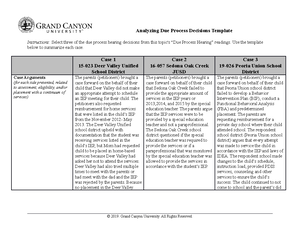- Information
- AI Chat
Was this document helpful?
Gabriel’s Transition Goals
Course: Professional, Ethical and Legal Practices and Policies in Special Education (SPED-300)
212 Documents
Students shared 212 documents in this course
University: Grand Canyon University
Was this document helpful?

SPD-300
Instructor Smith
08/07/2022
Transition Goals Template
Transition Goal
(Measurable goal)
Transition-Related Service
(Related to and supports
transition goal)
Activity
(Related to and supports
transition goal)
Education/Trainin
g
(i.e., vocational,
post-secondary
education, on-the-
job training,
apprenticeship, etc)
After graduating high school
Gabriel will further his education
by attending community college.
These courses will help improve
his independent skills. Life skills
will prepare him for the future.
Various community-based
programs that offer pre-vocational
training will be provided to
Gabriel once he graduates.
Gabriel will volunteer in different
opportunities that will allow him
to discover his interests in careers.
Employment
(i.e., sheltered,
volunteer,
competitive, etc)
Gabriel will continue to work and
shadow at the local grocery store
as a part-time worker. In addition,
he will participate in training
services three times a week and be
provided with support through a
vocational rehabilitation.
Gabriel will be given services for
job development from his
vocational rehabilitation. This will
help create future opportunities of
employment.
Gabriel will continue to shadow
employees at different jobs in
order to find his job interests.
Independent
Living
(i.e., daily living
skills, leisure,
Gabriel is expected to live with his
parents after graduation. He will
share responsibility for utilities
and other expenses. His parents
Gabriel will receive support from
a life coach and basic life skills
coach in order to help with daily
living.
Gabriel will participate in
community and academic events
in order to apply independent life
skills learned to his everyday life.
© 2019. Grand Canyon University. All Rights Reserved








